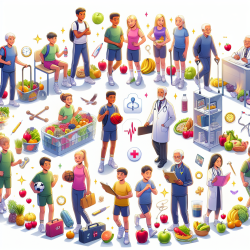Introduction
In the realm of speech-language pathology, especially when working with children, innovative approaches and interdisciplinary insights can lead to significant improvements in outcomes. The research article titled "A Preliminary Assessment of Food Policy Obstacles in California’s Produce Recovery Networks" provides a unique perspective that can be applied to our field. This blog will explore how the findings from this research can inform and enhance practices in speech-language pathology, particularly in educational settings.
Understanding the Research
The research conducted by Chiarella et al. (2023) identifies critical barriers and opportunities within California's produce recovery networks. These networks play a vital role in addressing food insecurity and reducing food waste. The study highlights operational and systematic barriers, such as inadequate infrastructure and complex regulations, which impact the efficiency of food recovery efforts. These findings are not only relevant to food policy but also offer valuable lessons for improving systems in educational and therapeutic contexts.
Applying Insights to Speech-Language Pathology
Here are some key takeaways from the research that can be applied to enhance child outcomes in speech-language pathology:
- Infrastructure and Support: Just as produce recovery networks require adequate infrastructure, speech-language programs need robust support systems. This includes access to technology, training, and resources to facilitate effective therapy sessions, especially in online settings.
- Regulatory Understanding: The study underscores the importance of understanding and navigating regulations. For speech-language pathologists, staying informed about educational policies and compliance requirements is crucial to ensure that services are delivered effectively and ethically.
- Collaboration and Coordination: The need for better coordination within food recovery networks parallels the necessity for interdisciplinary collaboration in speech-language pathology. Working closely with educators, parents, and other healthcare professionals can create a more cohesive approach to supporting children’s communication needs.
- Data-Driven Decisions: The research emphasizes the importance of data in identifying challenges and opportunities. Similarly, speech-language pathologists should rely on data-driven assessments to tailor interventions and track progress, ensuring that each child receives personalized support.
Encouraging Further Research
While the insights from this study are valuable, they also highlight the need for further research in both food policy and speech-language pathology. Practitioners are encouraged to explore interdisciplinary studies and consider how external factors, such as nutrition and policy, might influence child development and therapy outcomes.
Conclusion
By drawing parallels between food policy research and speech-language pathology, practitioners can gain new perspectives and strategies to enhance their practice. The lessons learned from California’s produce recovery networks can inspire speech-language pathologists to advocate for better infrastructure, understand regulatory landscapes, foster collaboration, and make data-driven decisions to improve child outcomes.
To read the original research paper, please follow this link: A preliminary assessment of food policy obstacles in California’s produce recovery networks.










